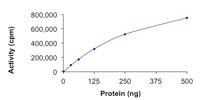
MELK (T460M), Active(M50-12G)
FOR BULK ORDER REQUESTS PLEASE CONTACT US
Description :Recombinant human MELK (T460M) (1-550) was expressed by baculovirus in Sf9 insect cells using an N-terminal GST tag.
Species :Human
Tag :GST tag
Expression System:Sf9 insect cells using baculovirus
Sequence :1-550 (T460M)
Genbank Number :NM_014791
Specific Activity :Sample Kinase Activity Plot. For specific information on a given lot, see related technical data sheet.
Purity :Sample Purity Data. For specific information on a given lot, see related technical data sheet.
Storage, Stability and Shipping :Store product at –70oC. For optimal storage, aliquot target into smaller quantities after centrifugation and store at recommended temperature. For most favorable performance, avoid repeated handling and multiple freeze/thaw cycles.
Applications :Kinase Assay
Molecular Weight :~88 kDa
Gene Aliases :HPK38, KIAA0175
Scientific Background :MELK or maternal embryonic leucine zipper kinase is a member of the Snf1/AMPK kinase family. MELK is a key regulator of the proliferation of malignant brain tumors including their stem cells(1). MELK transcript abundance correlates with malignancy grade in human astrocytomas and represents a therapeutic target for the management of the most frequent brain tumors in adult and children. MELK also plays a role in mammary carcinogenesis through inhibition of the pro-apoptotic function of Bcl-GL (2). Therefore, the kinase activity of MELK could be a promising molecular target for development of therapy for patients with breast cancers.
References :
1. Nakano I. et.al: Maternal embryonic leucine zipper kinase (MELK) regulates multipotent neural progenitor proliferation. J Cell Biol 2005; 170: 413–27
2. Lin ML. et.al: Involvement of maternal embryonic leucine zipper kinase (MELK) in mammary carcinogenesis through interaction with Bcl-G, a pro-apoptotic member of the Bcl-2 family. Breast Cancer Res 2007; 9: R17.
Product Sheets (By Lot #) :
Research Areas :Cardiovascular Disease, Neurobiology, PKA/PKC Pathway, Ser/Thr Kinases, Neurobiology, Cardiovascular Disease, ERK/MAPK Pathway, PKA/PKC Pathway, Ser/Thr Kinases
